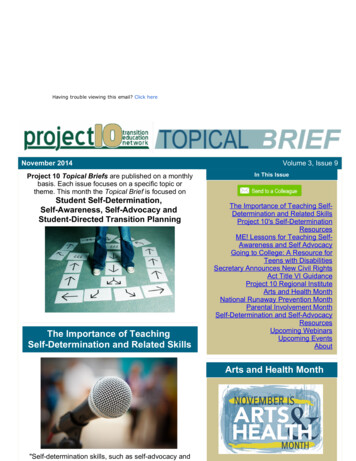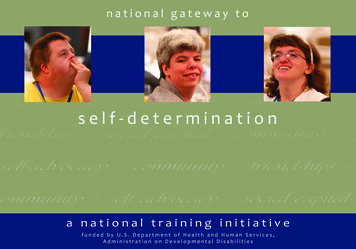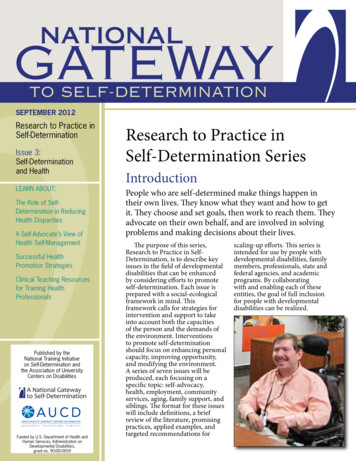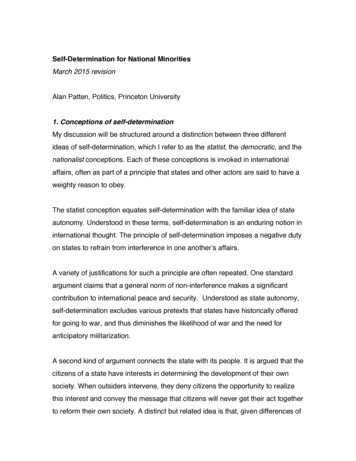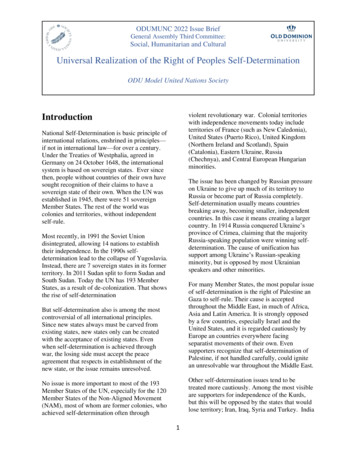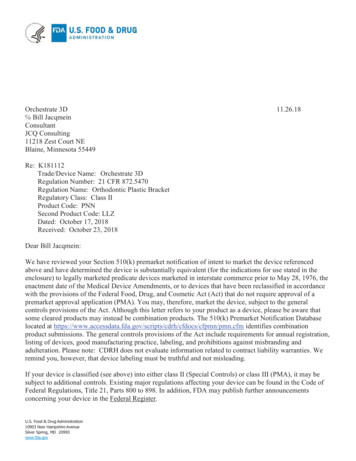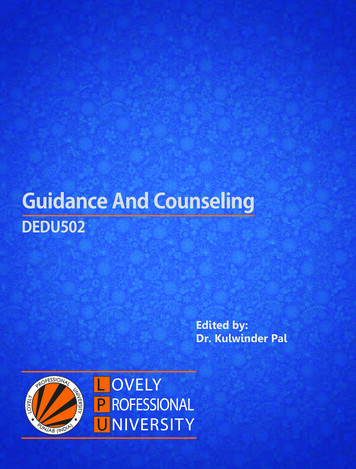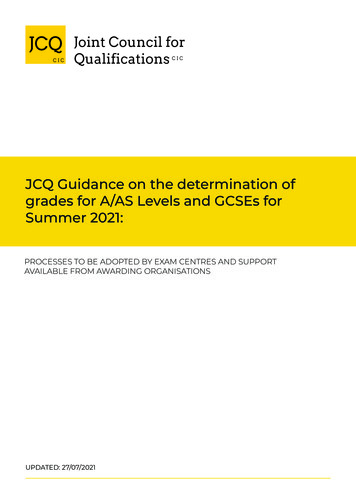
Transcription
InstructionsforonconductingexaminationsJCQ Guidancethe determinationofgrades for A/AS Levels and GCSEs forSummer 2021:1 September 2020 to 31 August 2021PROCESSES TO BE ADOPTED BY EXAM CENTRES AND SUPPORTFor the attentionof AWARDINGheads of centre,senior leadersAVAILABLEFROMORGANISATIONSwithin schools and colleges and examination officersProduced on behalf of:UPDATED: 27/07/2021 JCQCIC 2020
ContentsIntroduction.5Scope of guidance.5Other essential documentation.6Other relevant documentation.6Terminology.6What will awarding organisations do?.7What will centres do?.8Timelines and key dates.9Where to get awarding organisation information support and guidance.9The quality assurance process.11Internal quality assurance process.11External quality assurance process.13Centre Policy guidance .15Creating the Centre Policy.15Summary of the Centre Policy.15Content of the Centre Policy.16Statement of intent.16Roles and responsibilities.16Training, support and guidance.16The use of appropriate evidence.16Determining teacher assessed grades.17Internal and external quality assurance.17Comparison of grades to results for previous cohorts.17Access Arrangements and Special Consideration.17Addressing disruption.17Objectivity.18Recording decisions and retention of evidence and data.18Authenticating evidence.18Confidentiality, Malpractice and Maladministration, and conflicts of interest.19Private Candidates.19Results.19Appeals.19Centre Policy portability between UK jurisdictions.192
Guidance on grading for teachers.20Using grade descriptors and exemplification.24The grade descriptors.24The grading exemplification.24Using the descriptors and exemplification.25Using the grade descriptors.25Reaching a grade judgement.26The use of tracking data and predicted grades in reaching grading decisions.26Using data to support the grading process.27Introduction.27The use of data in reviewing overall centre outcomes.27What data needs to be considered?.27Internal quality assurance: using the data to inform the overall review of outcomes.28Once the review is complete.29Guidance on the use of additional assessment materials for 2021.30What are the 2021 additional assessment materials?.30What is the purpose of additional assessment materials?.31How and when should additional assessment materials be used?.31Do these materials need to be administered in exam conditions?.32What if students have seen some of this material before?.32What support materials will be provided?.32Understanding the outcomes.33Reasonable adjustments, access arrangements and special consideration.34Reasonable adjustments and access arrangements.34Special consideration.35Guidance for centres on modifying sets of questions.35Appropriate adjustments for students with visual impairments.36Advice on providing written or verbal descriptions of images.36Advice on creating sets of questions from awarding organisations‘ past papers.36The mark scheme.37Support from awarding organisations.373
Submission of grades.38What to consider when submitting grades.38Head of Centre declaration.39Guidance for exam centres accepting Private Candidates.40Private Candidates.40Overview of assessment process.40Supervising assessments.41Quality assurance and appeals.41Types of evidence.42Pre-existing evidence.42Sources of evidence.42Assessment materials provided by the awarding organisation.44Additional assessments.44Malpractice.46Centres/centre staff.46Students.47Results.48Appeals.49Centre reviews and appeals to awarding organisation.49Stage 1: centre review.52Stage 2: appeal to the awarding organisation.52Ofqual Exam Procedures Review Service.52Grounds for appeal.52Additional templates and support materials.544
IntroductionOn 4 January 2021, the Government announced that it was no longer fair for the Summer 2021examination series for GCSE, A/AS Level, Project Qualifications and Advanced Extension Awardin maths to go ahead due to the coronavirus (COVID-19) pandemic. The government set outits policy that centres will be submitting students’ grades in a letter dated 25 February 2021(Direction from the Secretary of State for Education to Ofqual’s Chief Regulator). JCQ and theawarding organisations have been working together to prepare guidance and information tosupport the provision of grades to students this summer by centres.In developing this guidance, we have: taken into consideration the needs of centres and teachers; ensured compliance with Ofqual regulations and requirements; and tried to minimise administrative burden for centres.This JCQ guidance provides information in respect of the process, from the creation andsubmission of a Centre Policy, through the determination of grades, requirements for internalquality assurance procedures, submission of grades to awarding organisations, the externalquality assurance process, the issue of results and the appeals process for students.If necessary, and dependent upon questions raised by exam centres, this document may beupdated. Such updates will be clearly marked and widely communicated. This would be toclarify guidance if required, rather than change the guidance itself.Some of this content requires actions. There is also supporting advice, information and templatesto make the submission of a Centre Policy straightforward. While some forms and templatesare optional, if not used, a similar approach to record keeping is required.Individual awarding organisations will issue additional guidance, including support materials ata subject level and information about the submission of grades. The JCQ will also be publishingthe detailed guidance for appeals early in the summer term.The JCQ and awarding organisations want to register their thanks to teachers, heads ofcentres, exam officers and colleagues across exam centres. We fully recognise the challenge ofdetetmining grades for students this year and we hope this guidance, the supporting templatesand proformas, will ease the administrative burden and ensure students, their parents, and allthose who use the grades awarded can have confidence that they have been determined asfairly and objectively as possible.Scope of guidanceThe scope of this guidance applies to all exam centres in England offering the followingqualifications regulated by Ofqual: A and AS Levels GCSEs (including short course GCSEs) Project Qualifications (L1, L2 and EPQ) Advanced Extension Awards (AEA) in maths Awarding organisations may specify additional qualifications they wish to be covered bythis guidance on a case by case basis.5
This guidance also applies to centres in Wales and Northern Ireland who deliver relevant Ofqualregulated qualifications. It does not apply to qualifications regulated by Qualifications Walesand CCEA in Northern Ireland for which further information can be found at: CCEA, Northern Ireland: ccea.org uk WJEC, Wales: www.wjec.co.ukOther essential documentationWhile this guidance lays out the processes, information and support available to centres fromthe JCQ and the awarding organisations, they must also read and consider the following Ofqualregulations including: Guidance: Information for heads of centre, heads of department and teachers on thesubmission of teacher assessed grades: summer 2021, Ofqual, 24 March 2021 Guidance: Information for centres about making objective judgements in relation toawarding qualifications in 2021, Ofqual February 2021 (Ofqual/21/6749/4)These documents provide information about how to determine grades, the evidence thatshould be considered in doing so, and objectivity in grading judgements. Both documentsmust be read alongside this JCQ document and the arrangements put in place for determiningstudents’ grades at each centre must be consistent with the expectations in them.Other relevant documentationThis guidance also takes account of a number of additional publications as listed below: Direction from the Secretary of State for Education to Ofqual’s Chief Regulator,Department for Education, 25 February 2021 General Qualifications Alternative Awarding Framework, Ofqual, 24 March 2021 Interim Guidance for Centres Accepting Private Candidate Entries for GCSE, AS and Alevel qualifications in Summer 2021 released on 15 March 2021 has been incorporatedinto the section on: Guidance for exam centres accepting Private Candidates.TerminologyFor clarity the terminology used in this guidance document has been standardised. Theterminology used is as follows: Awarding organisations: this encompasses, ‘exam boards’ and ‘awarding bodies’. Additional assessment materials: qualification-specific sets of questions covering keyknowledge, understanding and skills, provided with mark schemes and mapping grids. Centres: these are exam centres approved in the National Centre Number register(NCNR). Centre Policy: the policy sets out the processes centres will follow for determininggrades, in an appropriate, consistent and fair way – only one will needed to be submittedfor all awarding organisations6
Centre Policy Summary (Form): this is an online webform to be completed on the JCQCentre Admin Portal (CAP) summarising Centre Policy, which should also be uploadedwhen the form is completed – this needs to be completed only once for all awardingorganisations unless information is missing or needs to be clarified. Private Candidates: are students who have not studied with the exam centre thatmakes their entry. SENCOs: (Special Educational Needs Co-ordinators) this encompasses SEND (SpecialEducational Needs and Disability) leads in colleges and other relevant experts andassessors. Students: this means students entered for qualifications in 2021 within the scope of thisguidance as outlined above and encompasses ‘candidates’ and ‘students’. Support materials: to assist in the determination and submission of grades, for exampleguidance, training, exemplar responses, performance data and grade descriptors.What will awarding organisations do?Awarding organisations will provide centres with a package of support materials to assist in thedetermination and submission of grades, provide contacts and answer queries. This will includequestions, mark schemes, exemplar materials and grade descriptors. Awarding organisationswill provide training, support and guidance in a format to be defined; details will be providedby awarding organisations. JCQ will provide a specific learning resource module on Objectivityand Awarding.Awarding organisations will, in addition to the guidance on Centre Policies in this document,provide a template and guidance on how to submit them. Following submission, awardingorganisations will review all Centre Policies and may contact centres if they have any concernsabout the approach proposed in relation to any aspect of the process.Awarding organisations may arrange a virtual visit (via Zoom, Microsoft Teams or an alternative)with centres to provide further support and guidance where questions remain about a CentrePolicy.After the submission of grades, awarding organisations will work together to conduct a qualityassurance exercise that will have elements of both targeted and random sampling of centresso that the grades awarded across the system command confidence. Further information canbe found in the quality assurance process.Awarding organisations may have further contact with centres if, following any sampled qualityassurance activity, they have concerns in relation to the teacher assessed grades submitted.Awarding organisations are responsible for determining final grades and awarding qualifications.They will also manage the second stage of appeals.7
What will centres do?Centres will create and submit a Centre Policy – a pre-populated template option is availablehere. This will: outline the roles and responsibilities of individuals in the centre; detail what training and support will be provided to centre staff involved with theprocess, including any training around bias and objectivity in assessment and gradingdecisions; confirm the approach to be taken when determining teacher assessed grades, includingconsideration of evidence and how that evidence informs students’ grades; detail the internal quality assurance processes that are in place; detail any provision for Private Candidates, if applicable.Centres will collaborate with awarding organisations if any concerns are raised following thesubmission of a Centre Policy. This may include participating in a virtual visit.Centres will review grades determined by teachers in line with the Centre Policy.Centres must ensure that students are aware of the evidence used to determine their grade.Although teachers may share results associated with individual pieces of evidence, they mustnot share with students the grades submitted to awarding organisations before results arereleased.Centres must submit teacher assessed grades to the awarding organisations with a Head ofCentre Declaration that confirms that the centre complied with its Centre Policy. A declarationform and guidance on how to submit them will be provided by awarding organisations alongwith information on grade submission.Centres will collaborate with the awarding organisations where external quality assurancesampling is required, which will include participating in a virtual visit.Centres will release results to students for qualifications as required by the Department forEducation on 10 August for A/AS levels (Level 3 qualifications) and 12 August for GCSE (Level 2qualifications).Centres will, on request, conduct the first stage of the appeals process, to check if an administrativeor procedural error has occurred. Centres will also be required to submit second stage appealsto the awarding organisation on a student’s behalf, if the student continues to believe that anerror persists or the grade awarded was an unreasonable exercise of academic judgement. Fulldetails on the appeals process are provided here.8
Timelines and key datesThe overall process for awarding in 2021 is illustrated on the next page. The key dates to beaware of are: 22 March to 22 April: Entry amendments window open for centres 31 March: Additional Assessment Materials (sets of questions, mark schemes andmapping) 12 April: Additional support materials (marking exemplification) 12 April to 30 April: Window for Centre Policy submission via proforma on CAP (CentreAdmin Portal) 19 April: Additional sets of questions publicly available. Additional support materials(grading exemplification) securely available to centres 19 April to 11 June: Awarding organisations review Centre Policies and conduct virtualvisits where needed 26 April: Entry deadline for Private Candidates 26 May to 18 June: Window for Teacher Assessed Grades submission opens viaawarding organisations’ respective portals 18 June to 16 July: Awarding organisations conduct sample checks of evidence (* inexceptional circumstances, sample checks may take place until 23rd July) 10 August: A/AS Levels and relevant other Level 3 results day 12 August: GCSE and relevant other Level 2 results day 10 August to 7 September: priority appeals window» 10 August to 16 August: student requests centre review1» 10 August to 20 August: centre conducts centre review» 11 August to 23 August: centre submits appeal to awarding organisation 10 August to end October: majority of non-priority appeals take place» 10 August to 3 September: student requests centre review1» 10 August to 10 September: centre conducts centre review» 11 August to 17 September: centre submits appeal to awarding organisationWhere to get awarding organisation information support and guidanceAwarding organisation can be contacted for further advice and information specific to specifications.The links are as follows: AQA: www.aqa.org.uk/2021-exam-changes WJEC/Eduqas: ion-andupdates/ OCR: mer-2021/ Pearson/Edexcel: hools.html1The dates above for students to request centre reviews of 16 August 2021 for priority cases and 3 September 2021 for non-priority cases aresuggested timescales. Centres may choose to set their own internal deadlines but priority appeals must be submitted to the awarding organisationby 23 August 2021 and non-priority appeals by 17 September 2021.9
10
The quality assurance processThe quality assurance process will support centres to construct appropriate processes to underpinthe determination of grades. There are internal and external elements to the process.The starting point of the process is the Centre Policy. This sets out the processes centres willfollow for determining grades, in an appropriate, consistent and fair way. The policy shouldreference all of the relevant external advice and guidance provided by Ofqual, the JCQ and bythe awarding organisations. A template for a Centre Policy is available on the JCQ website, andcentres can adopt and adapt this document. Each Head of Centre will then need to produce asummary of the policy which will be submitted to the awarding organisations for review. TheCentre Policy Summary Form can also be previewed online on the JCQ website ‘Summer 2021Arrangements’.Internal quality assurance processEvery centre must produce a Centre Policy; this can simply be done by choosing to adopt oradapt the pre-populated template. Centres will only be expected to produce one full CentrePolicy document and complete one Centre Policy Summary Form, even if they have entries withmore than one awarding organisation. The Centre Policy Summary Form must be uploadedto the Centre Administration Portal (CAP) by 30th April 2021 and must be signed by the Headof Centre. The full Centre Policy is to be uploaded to the CAP as an attachment. Awardingorganisations will contact centres that haven’t returned these documents by 30th April 2021,or if they have missing/incomplete information.The Centre Policy will: Outline the roles and responsibilities of individuals in the centre Detail the training and support provided for newly qualified teachers (NQTs) andtraining around objectivity in decision making Set out the approach for the determination of grades including how evidence will beused Describe the process that will be adopted where a potential conflict of interest has beenidentified, such as where a teacher’s relative is a student Outline the internal quality assurance processes in place including arrangements tostandardise judgements and consider teacher assessed grades against results fromprevious years when exams have taken place (2017 to 2019) Detail any provision for Private Candidates, if applicable.Exams officers will be provided with further details regarding submission of the policy summary,although the process will be similar to that used in usual exam years for the submission ofrequests for Reasonable Adjustments through Access Arrangements Online.11
12
External quality assurance processSTAGE 1 – Centre Policy reviewFollowing submission awarding organisations will carry out a review of all Centre Policy SummaryForms. This is to ensure the arrangements each centre has in place are appropriate. Awardingorganisations may contact centres where they have questions or concerns. At this point, centreswill only be contacted by one awarding organisation. It is possible a centre may be contactedby an awarding organisation with which they do not have any entries.All centres will receive email confirmation that their Centre Policy has been received. Centresdo not need to wait for approval before beginning their grading processes. Centres will thenreceive an email confirming that their policy has been ’Accepted‘ or that there is a need forfollow-up contact. Centres may be contacte
6 This guidance also applies to centres in Wales and Northern Ireland who deliver relevant Ofqual-regulated qualifications. It does not apply to qualifications regulated by Qualifications Wales



